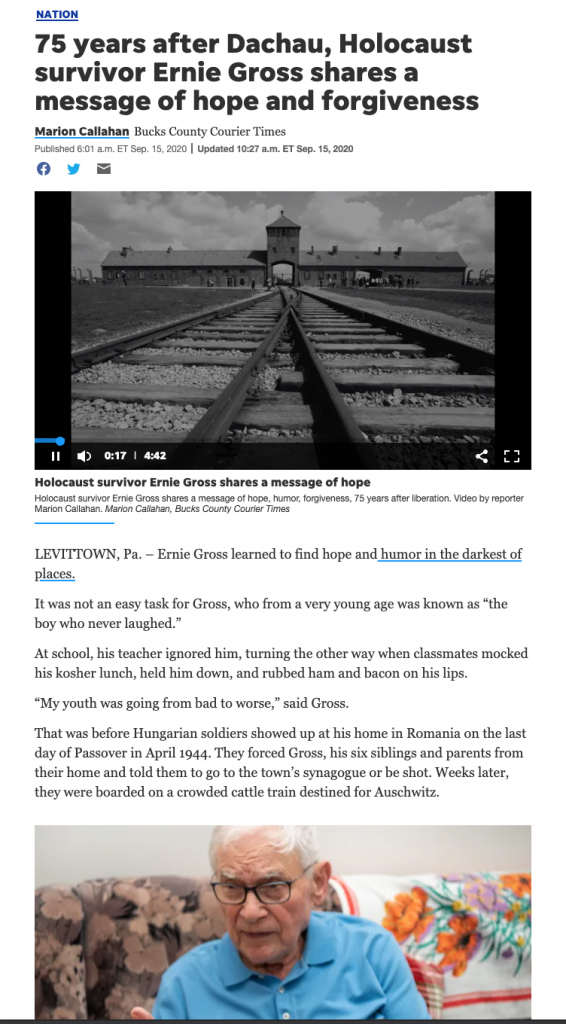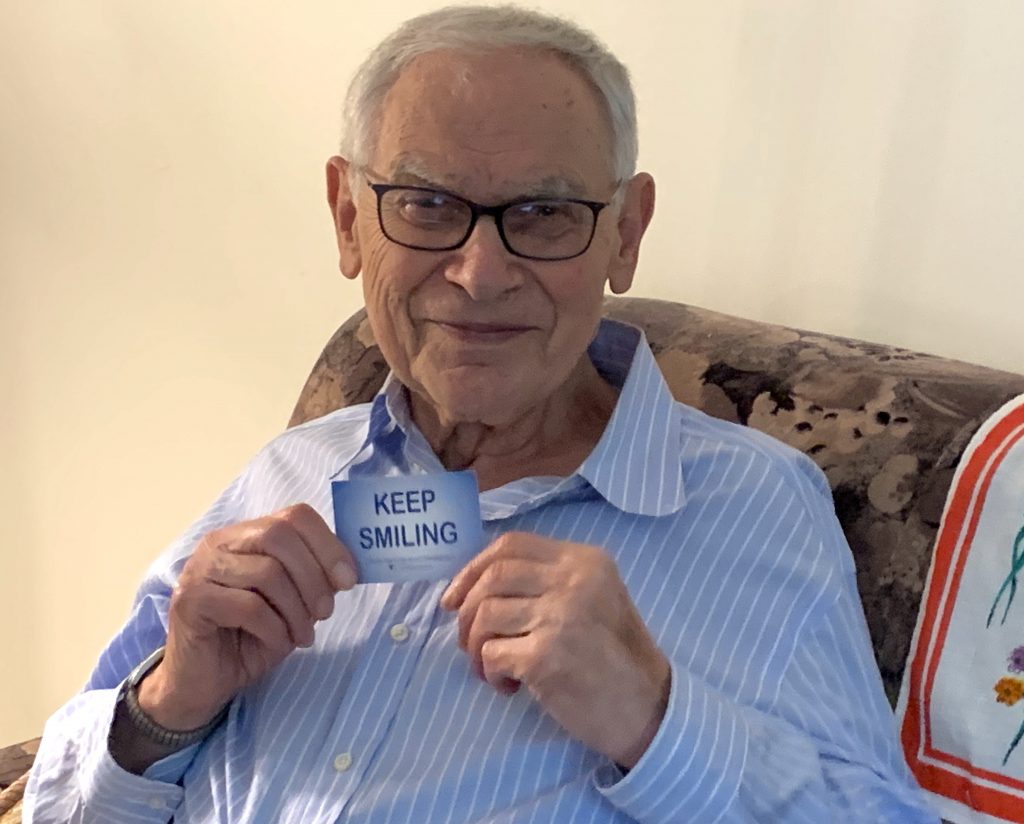As seen published in USA Today, The Bucks County Courier Times and The Intelligencer.
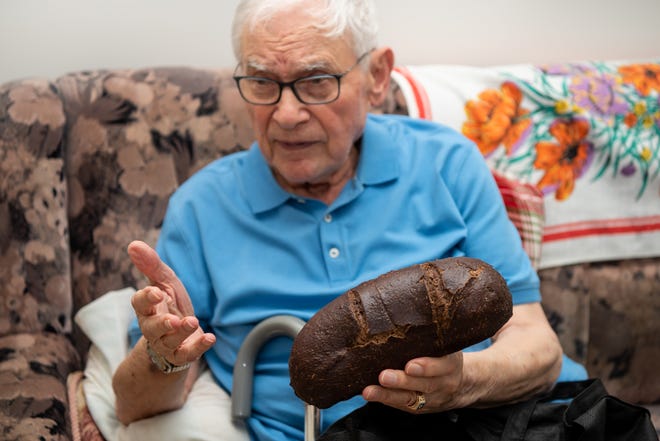
Ernie Gross learned to find hope and humor in the darkest of places.
It was not an easy task for Gross, who from a very young age was known as “the boy who never laughed.”
When he did laugh as a child, banging pots and pans with his older brother David, his mother would scold him. “How can you laugh and enjoy yourself when you don’t know what’s happening with your father?” she would say.
His father had left home when Gross was just 7 to work in Argentina for four years. Upon his return, didn’t recognize his young son, a rejection that crushed the boy’s spirit. At school, his teacher ignored him, turning the other way when classmates mocked his kosher lunch, held him down, and rubbed ham and bacon on his lips.
“My youth was going from bad to worse,” said Gross.
That was before Hungarian soldiers showed up at his home in Romania on the last day of Passover in April 1944. They forced Gross, his six siblings and parents from their home and told them to go to the town’s synagogue or be shot. Weeks later, they were boarded on a crowded cattle train destined for Auschwitz.
What came next took decades to reveal.
From his home in Northeast Philadelphia one recent day, Gross told his story through his thick Romanian accent, painting a vivid picture of a harrowing journey that took more than 60 years to disclose, even to his three children.
His early years, shaped by hate and horror, reflect a dark time burdened by sorrow but never devoid of hope. Ironically, in his pursuit to shed what he calls the “selfish mindset of survival,” he found forgiveness, charity and the healing power of humor and laughter.
Today, the 91-year-old is among a declining number of Holocaust survivors alive and able to share his story. This year marks the 75th anniversary of his liberation from Dachau, and Gross continues to speak at synagogues, churches, rotary events and now on Zoom calls to spread the message that hope prevails above hate.
It’s a message, he says, that’s as relevant to surviving in today’s world as it was that day he stepped off the train.
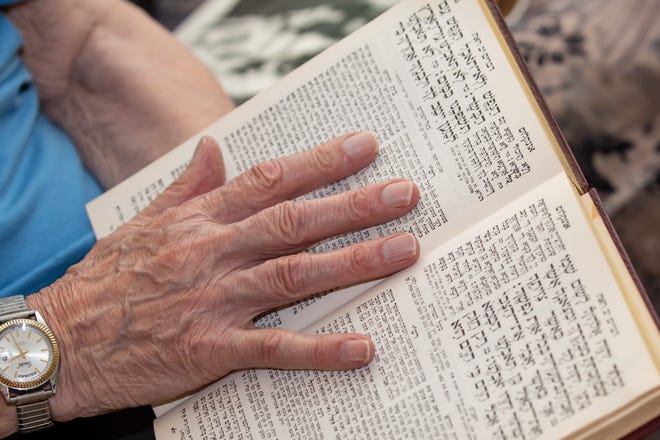
‘I didn’t have a name’
He was just 15 then.
Upon arriving at Auschwitz, Gross lost sight of his parents, who were ahead holding onto his younger sister and brother. Surrounded by German soldiers, Gross stood in a line with his two older brothers, and noticed a prisoner working at the camp looking at him.
When the soldiers weren’t looking, the prisoner jumped off the train and approached him. “How old are you? You better say you’re 17. Because if you’re 15, you’ll go where your parents went.”
The man pointed to the sky. “You see the dark smoke? In four hours, it’s going to be your parents.”
Gross watched as an SS officer directed his brothers to the right, in the direction of those going to the work camp. In the other direction were the gas chambers.
“My turn came,” Gross recalled. The guard was silent. “He was not saying anything … That made me more nervous. He was scanning me, trying to figure out where to put me.” Gross mustered up the nerve to act older. “I’m going to stand up straight and tall and (talk) strongly. When I did that, he told me to go to the right.”
He joined his two brothers as they stood in a big building packed with prisoners. They didn’t say a word about the fate of their parents and younger siblings.
They were stripped of everything they had — clothes, hair and, soon, their names.
“My number was 71366. I didn’t have a name, just my number.”
Learning to survive
When Gross first saw the barracks and witnessed how prisoners were living, “I can’t even tell you how lonely and helpless I was.”
He had been separated from his brothers. They went to one camp, while he was imprisoned in a camp 50 kilometers from Munich, Germany.
Life over the next year was a test in survival. For nearly a year, he shifted from one camp to another, hoping to avoid “Camp 7,” where those who were unable to work went and where no food was provided.
“I was determined to live,” said Gross. That took creative rationing and reasoning.
A small aluminum container held his daily ration of coffee and soup, and he kept this with him at all times. “If we were lucky, we would get a little piece of potato in the soup.”
A small loaf of bread about 10 inches long had to be split among eight prisoners, he said. Gross broke his into small crumbs that he would nibble on throughout the day, and one morning he asked a neighboring prisoner why he didn’t do the same.
The man replied: “How do I know I’ll be here for lunch?”
“Those kinds of people died first because they gave up hope. I made up my mind every day when I got up that no matter what life would give me, I wanted to be here for the next day. I never gave up,” Gross said.
One day, a father begged his son to swap slices, both arguing that they needed the larger piece more. To survive was to be selfish, Gross saw, even with family. He learned this first hand after his cousin, also imprisoned, refused to share even a sliver of skin of a whole potato he had.
The food was never enough to keep prisoners alive for very long.
“It was not unusual for me to get up in the morning to see that neither of my neighbors got up. They died through the night. There was a group of prisoners … their job was to go to all the barracks to take out the dead people and put them in small wagons. Most died of starvation.”
Gross needed to find another source of food.
He learned that some prisoners, who were former smokers, offered their bread for at least seven cigarette butts, so Gross scoured the train stations where he cleaned toilets.
“It took me two weeks to find seven butts, but I knew that I would live seven days longer.”
One night when his hunger was unbearable, he heard Allied Forces planes flying over the camp. “When that happened, all the lights go out in the camp,” he said. He snuck to the kitchen to get food. He avoided being seen by the guards, but on the way back, other prisoners attacked him, taking the potato he managed to steal and one of his shoes.
The next day, it snowed.
“I couldn’t walk,” said Gross, adding that a guard threatened to shoot him if he didn’t join the others and work that day.
So he jumped in the snow, careful to not let his toes freeze.
“Whatever life gave me, I just tried to deal with it. Instead of feeling sorry for myself. That’s how I did everything; that’s how I survived it,” said Gross, who was eventually able to negotiate with another prisoner to get a pair of shoes that fit.
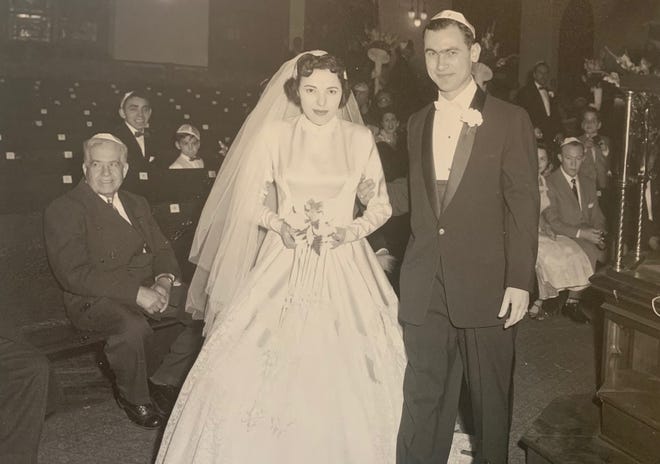
‘No longer felt pain’
His daily work was grueling, hauling 50-pound bags of cement to trucks.
“When I put it on my shoulder, it felt like my bones would break, but the guards would yell ‘Mach schnell,’ meaning ‘Do it faster,’ Gross said.
If they didn’t move fast enough, the guards would beat them.
“It got to a point where my body didn’t feel the pain … You’d be surprised at what your body could take when you have to. It went on for eight hours like this every day.”
But the saddest moment for Gross didn’t come during the physical beatings, or at night when he was writhing in pain from the cold and hunger. It was the sight of a butterfly outside the barracks.
“I was watching it fly over the fence. Nobody stopped it. It had the freedom of the world. If I tried that, I would be shot … I thought about the world out there and that the world doesn’t know what’s happening to me.”
He felt the despair of others, too. One day, marching next to two other prisoners, a man questioned the existence of God.
“He said, ‘If I survive this, I’m not going to believe in God. I said, ‘Why not?’ He said, ‘Two days ago, I had a wife and 10-year-old son … Both are gone. How could God do something like that?’ A man to my left overheard this and said, ‘I never believed in God, but If survive, I’m going to believe in God.’ Everyone had a different way about thinking about God.”
That night, Gross dreamt he was in a room with God and God sneezed. “I didn’t know what to say to him,” said Gross, a thought that made him chuckle.
He would come back to that moment, over and over again, a humorous thought from a dream long ago that would make him and others laugh.
Camp 7
The day came when Gross was too weak to work. His weight had dropped from 145 pounds to 85 pounds. He was moved to Camp 7. He knew what that meant.
Gross, then 16, was forced onto another train, this time headed to Dachau. It was supposed to arrive a day earlier, on April 28, but Allied Forces bombings stalled the journey by a day.
When he stepped off the train, he was among thousands of inmates inching their way in the direction of Dachau. He remembers the struggle to stay on his feet, marching in the cold drizzle, his soaked clothes weighing on his frail body.
When the crematorium came into view, Gross said he felt relieved, “almost happy.”
“I knew in a half an hour it would be over. I wouldn’t be cold. I wouldn’t be hungry.”
As he began to accept his fate, the line suddenly stopped.
“A guard threw his weapon down, and it fell in the water and splashed me. I looked around and no one was moving.”
He looked up and saw an American Jeep, with four American soldiers at the gate. American troops had arrived to liberate the camp. It was April 29, 1945.
His next memory was waking up a sanitarium, where prisoners were sent to recover. There was a room dedicated for prayer services, and while inside that room one day praying, the door flew open. His older brother Abraham was standing there.
“I felt both happy and sad,” said Gross, noticing that his favorite brother David wasn’t beside him. He later learned that David died of starvation in the camp. Gross also lost his parents, two brothers and a sister, and several other relatives.
Unable to stay in Romania, where Jews were attacked, Gross settled in Philadelphia, where his aunts lived. He married and had three sons, but never discussed his Holocaust experiences with any of them.

Ending the silence
Gross’ first wife Bella, also a victim of the Holocaust, never spoke of her time in the Nazi death camps. When she died, he realized he lost a part of her that no one would ever know.
“I was going through my life at night, thinking of her, and I found the energy to speak.”
That first trip to the podium didn’t come easy.
“I was trying to tell my story, but I couldn’t do it,” said Gross, remembering people approaching him with napkins to wipe his nose and eyes. “I couldn’t continue like that. So when I got to the point I couldn’t speak, I threw in a joke, and sure enough it worked perfectly.” https://c24f28d18fb5227b9533bac48a95c181.safeframe.googlesyndication.com/safeframe/1-0-37/html/container.html
He remembered God, and the dream he had in the barracks that night “when God sneezed … that always gets a laugh,” he said.
The more he joked, the more he laughed and the easier it became to share.
Over the last 10 years, he’s spoken dozens of times, and most times with a bag of props — a loaf of bread, seven cigarette butts and a potato.
He says the potato is symbolic, a reminder of what he learned at the camp and what he had to “unlearn,” the “selfish” survival skills.
His cousin, who had refused to share even a small slice of potato skin with him in the work camp, reached out to Gross years after their liberation. “He said, ‘If you don’t loan me $500, next week I’ll be homeless with two children and my wife.’ So, do I get even with him or help him?”
The Hebrew word, tzedakah, which encourages charity, came to mind.
He said he realized that only through acts of generosity and charity could he begin to “retrain” his brain to fight the selfish tendencies he learned at the camp.
When students hear his story, they ask questions like, “How can you believe in God? How do you forgive?”
He tells them: “If you don’t forgive, it means you’re angry. If you forgive, your body can relax and you keep on functioning.”
Spreading joy is another way to move forward. When he sees someone looking despondent, he pulls from his wallet a laminated light blue card that reads “keep smiling.”https://c24f28d18fb5227b9533bac48a95c181.safeframe.googlesyndication.com/safeframe/1-0-37/html/container.html
“I know how it feels when you are not smiling — that’s how I grew up. I don’t want people to be ignored. When I show them the card, all of a sudden, their whole body and face changes. I feel like I’ve accomplished something.”
Rising above hate
Still, in today’s world, there are images of hate that are hard to stomach, including the video of George Floyd dying beneath the knee of a white police officer.
“I had to close my eyes when I saw that.” In all his years, he said, “I cannot figure out how one person could hate another so badly.”
Even after sharing his story hundreds of times, it’s never easy to recount the horrors of the Holocaust. But he feels it’s his duty to teach others the power of hope and the healing power of forgiveness.
“We all come from the same source; it doesn’t matter where you came from or what you look like. People shouldn’t get angry because someone is different. We have to learn to get along … we have to learn to forgive.
“I believe in that throughout my life. And if you don’t lose hope, you could live longer and be happier. No matter what happens, tomorrow can be better. That is why I’m 91 and am still here.”
